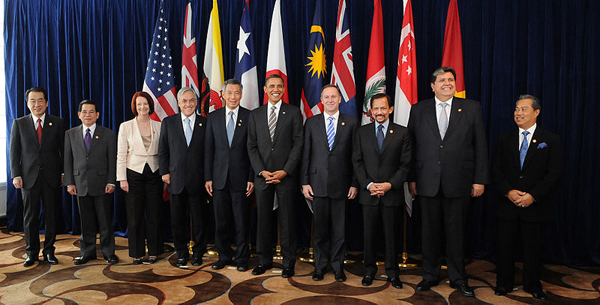The Trans Pacific Partnership Agreement, a massive proposed trade deal that includes Canada, the United States, Australia, Mexico, Malaysia, Singapore, New Zealand, Vietnam, Japan, Peru, and Chile, has long been the target of criticism owing to the veil of secrecy associated with the draft text. While negotiations have been ongoing for several years, participating countries have steadfastly refused to release the working text that addresses everything from agriculture to copyright, claiming that trade talks must be conducted behind closed doors.
Last week, Wikileaks released a leaked version of the intellectual property chapter, which confirmed that the U.S. hopes to use the agreement to export extreme intellectual property provisions that are out-of-step with international norms. Indeed, the 95-page document validates fears that the real reason for the TPP secrecy is that the negotiating countries have plenty to hide.
While many of the leaked proposals are cause for concern, the good news is that Canada often finds itself opposing some of the most draconian demands with negotiators promoting Canadian law as a suitable alternative.
The U.S. finds itself relatively isolated on many issues, with only Australia offering consistent support for its positions. For example, Canada and most other TPP countries support a general objectives provision that references the need for balance, promotion of the public domain, protection of public health, and measures to ensure that intellectual property rights themselves do not become barriers to trade. The U.S. and Japan oppose these objectives.
If the U.S. is successful in pressuring other countries to meet its demands, Canada would be required to radically overhaul its current law, reversing course on many of the rules the government recently enacted as part of its long-awaited copyright reform package or negotiated in the trade agreement with the European Union.
Bullish US aims to override Canadian law
Internet provider liability is likely to emerge as one of the most contentious issues. The U.S. is demanding a provision that could lead to terminating subscriber access, content blocking, and even monitoring of online activities. Moreover, it requires a privacy override to mandate disclosure of subscriber identities based merely on unproven claims of infringement. Canada is opposed to the U.S. proposal.
The U.S. also wants Canada to extend the term of copyright. Canada (along with several other TPP countries) currently features a term that meets the international standard of life of the author plus an additional 50 years. The U.S. would like Canada to extend the term by an extra 20 years, thereby keeping works out of the public domain for decades (Mexico is seeking an additional 50 years).
The U.S. supports the inclusion of extensive criminal penalties in the TPP, even in non-commercial cases. In one provision, it is seeking mandatory criminal liability for significant infringements without any direct or indirect motivation of financial gain. Similarly, it wants mandatory criminal rules for breaking digital locks, an approach not found under Canadian law.
The U.S. also envisions massive changes to Canadian patent law with the expansion of patent protections to plants and animals with few safeguards, altering the standard of utility under Canadian law, and extending the term of patents in a manner that would keep generics off the market and increase health care costs.
Even the proposed Canadian anti-counterfeiting bill currently before the House of Commons comes in for criticism, with the U.S. demanding statutory damages for trademark infringements and seizures of in-transit shipments of suspect goods that are not destined for the Canadian market.
In short, a TPP based on the U.S. proposals would signal a near-complete surrender of a made-in-Canada approach to intellectual property, leading to risks of lost Internet access, expansive border seizures, increased health care costs, and criminal liability for non-commercial infringement. The leaked text provides much need sunlight on the secret talks, confirming that Canada has thus far resisted many U.S. demands and that it has the potential to play a lead role in restoring some balance to the trade deal. ![]()
Read more: Politics
















Tyee Commenting Guidelines
Comments that violate guidelines risk being deleted, and violations may result in a temporary or permanent user ban. Maintain the spirit of good conversation to stay in the discussion.
*Please note The Tyee is not a forum for spreading misinformation about COVID-19, denying its existence or minimizing its risk to public health.
Do:
Do not: